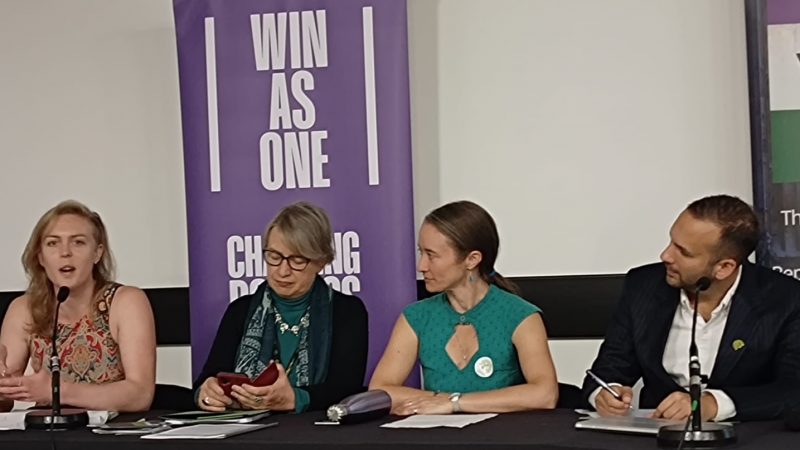"The people, given the power, will lead us on climate action - and PR is a very direct way to give people power".

Britain’s democratic processes are stopping meaningful action on the climate crisis, attendees at Green Party conference heard this weekend. At a fringe meeting at the party’s autumn conference, party members were told that in order to tackle the climate emergency, Britain needs to establish itself as a ‘real democracy’. The meeting was hosted by political reform groups Make Votes Matter, Unlock Democracy and Compass and was designed to explore how Britain’s democratic deficit makes tackling environmental issues more difficult.
The meeting was opened by the founder of Make Votes Matter Klina Jordan, who told attendees that ‘unrepresentative government’ is holding the UK back from addressing the climate crisis. She said: “We can’t bring about the change that we need to take fast on climate action or to address all of the other environmental and ecological issues that we need to without real democracy. It’s very clear that the vast majority of the public want to take faster action on these crises, and governments have not been doing that in this country for a long time.”
“My strong belief, and there’s a lot of evidence to this effect, is that it’s because we have a very unrepresentative government.”
While Jordan argued that there is a strong public desire for more rapid climate action, Frances Foley – the deputy director of Compass – also made the case that there is similar support among the electorate for change to the political system. She told the meeting: “79% of people think that the political system is broken, and 85% of people think that the mainstream parties won’t fix it.”
She went on to argue that this is evidence that political reform is a major issue that progressives should be campaigning on. “The classic that any PR campaigner has heard is ‘this is not a doorstep issue’, she said, adding that over the last decade the UK has “seen Brexit, we’ve seen huge support for independence in Scotland, and we’ve seen increasingly people bringing up the reason that they don’t vote is that they think nothing changes.”
The meeting didn’t only hear about the unpopularity of the current political system, however. Panellists also addressed how Britain’s ‘first past the post’ electoral process means that governments can be elected with a minority of votes cast and what this means in terms of whose views are represented.
Describing the Tory party’s current campaign strategy, Unlock Democracy director Tom Brake told the meeting: “You have a situation where – for instance – in 2005, Labour secured I think it was something like a 70 seat majority on 35 per cent of the vote. Now, we now have a scenario where clearly Mr Sunak is trying to appeal to 35% of the electorate – those who are, as he sees it, anti-woke, pro-car, pro-meat, and a range of other things like anti-car sharing. And so because of our political system, our voting system, he is able to do that with a degree of certainty that if he hits that bar of 35 per cent, he could well be returned with a majority in parliament. So clearly, we need to change that.”
This message was also delivered by the Green Party’s deputy leader Zack Polanski, who argued that Britain has ended up with right wing governments who fail to address people’s desire for action to tackle issues like the climate crisis, the poor state of the NHS and institutional racism in the police. He told the meeting: “Until we have proportional representation, and until we have a fair voting system, we can’t tackle any of those things sustainably. So, we really need to change the voting system.”
The meeting wasn’t solely addressed by political reform campaigners and leading members of the Green Party. Abdi Suleiman from environmental NGO Friends of the Earth was also on the panel. He agreed that there is a need to reform the political system in order to accelerate action on climate.
Suleiman said: “I don’t think anyone would design a political system that looks like the one we’ve got. I don’t think anyone would design a system where there is so much centralised power in a prime minister who can then pick the cabinet and get rid of them at will, who can then hire MPs and then they have to vote with the government, who is also the leader of the largest party in parliament, and therefore can legislate more or less as they want, with a court system that when the prime minister or the government loses a court case, they can just change the law – which they have done more than once.”
He later added that, in Britain, “there is a deep connection between those who are profiting disproportionately from the climate crisis and the political class that are profiting from being close to those that are profiting from the climate crisis.”
The final speaker was Green Party peer Natalie Bennett. Among her contributions, she summed up the takeaway in the simplest of terms. Reflecting on how politicians could be made to address the climate emergency given the overwhelming public support for more urgent action, she said: “The people, given the power, will lead us on climate action – and PR is a very direct way to give people power”.
Chris Jarvis is head of strategy and development at Left Foot Forward
This article was sponsored by Unlock Democracy and Make Votes Matter
To reach hundreds of thousands of new readers we need to grow our donor base substantially.
That's why in 2024, we are seeking to generate 150 additional regular donors to support Left Foot Forward's work.
We still need another 117 people to donate to hit the target. You can help. Donate today.



